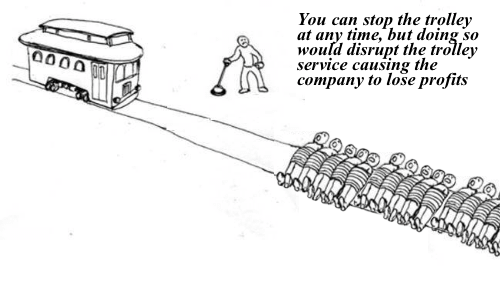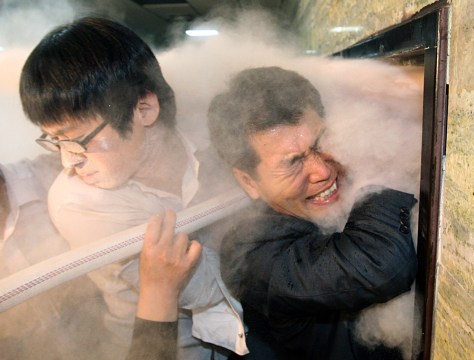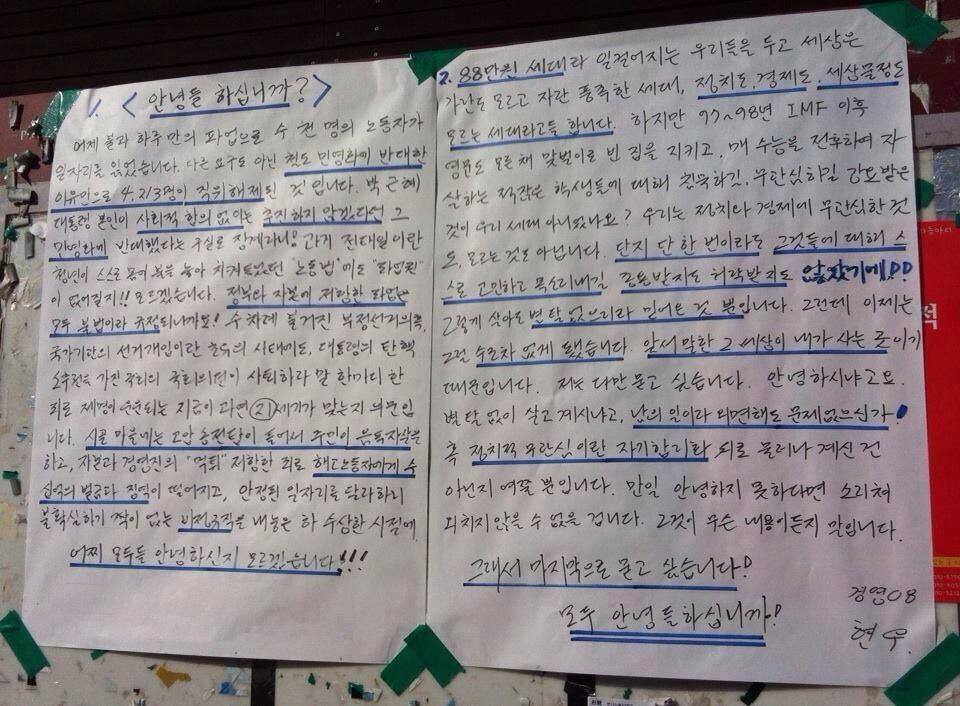The video is exploding on Facebook, and I dare not open my twitter stream...
I have a few thoughts about this piece, and a few ideas about how to respond effectively. I'll try to be as brief as I can.
But first...
Meet Babyseyo. I don't want him to grow up in a country that tells him his mother was a victim of his father.
1. Things are getting better.
As upset as we all are, things are getting better here in Korea, when it comes to this kind of race-baiting.
In 2005, SBS ran an episode of a show based on a controversial post at a website called "English Spectrum" (
that post) (
that episode)
Immediately after the broadcast, the bulletin board on the program's website was flooded with over 1,000 furious posts. "I was so infuriated after the broadcast that I couldn't sleep," one read. "I'm frightened to send my children to an English academy," read another. "Foreign language institutes must do some soul-searching," said a user giving their name as Han Seon-yeong. "We must quickly deport all those low-quality foreign English teachers who try to pick up girls near Hongik University or Apgujeong."
The extreme nature of some of the attacks has led to concerns for the safety of foreign residents in Korea. "After watching the broadcast, I began to look differently at the native English speaker who teaches in the elementary school where I work and the Korean English teacher who works in the same classroom," a user giving her name as Yun Eun-hwa said.
This time, when MBC does another hit piece,
according to Busan Haps, "The video has spawned thousands of comments, overwhelmingly negative, against the broadcaster, with thousands of views and over 600 video shares in a matter of hours."
Comparing the release of photos from 2005's "Playboy Party," which inspired
the Anti-English Spectrum, and for example, the appearance of the "
See These Rocks" video, which got a week or so of coverage, maximum, and then kind of faded from memory as After School released a new video or something... things are getting a LOT better. Let's remember that, and be willing to mention that when we talk with people about this video.
That said... a video like this is still bad, and wrong, and DOES merit a response, every time, until MBC and other outlets figure out that "Korea doesn't roll that way anymore."
Interestingly, a quick scan of
headlines shows that the Chosun (the conservative paper) is more likely to race-bait than
the Hankyoreh, the most influential progressive paper.
Oh... and Scroozle mentions the 2018 Olympics, as in "Korea's on the global stage now... this kind of thing won't wash anymore" ... sorry to say it, but the 1988 Olympics were awarded to Seoul barely more than a year after Chun Doo-hwan had massacred hundreds and maybe thousands of democracy protesters in Gwangju, and a mere two years after Tiannanmen Square, the head of the IOC was encouraging China to put in a bid for the 2000 Olympic games that went to Sydney. As blind eyes go, the IOC clearly knows where their bread is buttered, and will cheerfully turn a blind eye to this, and secretly high-five each-other if this is the worst thing they have to ignore in the build-up to Pyeongchang 2018.
2. Let's not forget foreign men are not the only victim of this video...
Along with the old "Korea throwing Foreigners under the bus" thing, let's not forget, and let's be quite loud in voicing the other major problem with this video: the way it treats Korean women as if they are idiots with no self-agency, ripe and passive victims to the blue-eyed voodoo of white males.
Because this video is just as much about women being easily duped and victimized, as it is about foreign men, and the idea that Korean women are helpless, faced with foreign men, is insulting to the intelligence and freedom of Korean women. It also has hints of possessiveness -- "they're OUR women..." which is also insulting and degrading to Korea's smart, dynamic, diverse, well-educated and self-determining females.
3. The ideal response (to this video)
So what IS needed?
Well, to begin with, it'd be awesome if there were a civic group in Korea, composed of expats and migrants, who basically acted as a watchdog for stuff like this. An anti-defamation league of language-savvy expats keeping an eye on media in general, publicizing cases, and making sure that racism in Korean media doesn't pass unchecked. But that doesn't exist yet.
I think the most powerful response to a video like this would be another video. A video that reminds MBC of the impact of spreading hateful messages. A video of long-term expats who speak Korean. Or who have families: multicultural families with kids who are Korean citizens, who attend Korean schools, who speak Korean, who have Korean grandmothers and grandfathers who adore them. Speaking to a MBC, and the rest, in Korean, saying, "Don't tell Koreans my father has HIV. Don't tell Koreans my mother is probably a criminal. Don't tell Koreans my wife is a victim. I CHOSE to marry my foreign wife. I CHOSE to marry my foreign husband, because we love each other. Pretending foreigners are all criminals hurts Korean families. It hurts your kid's teacher. It hurts the fathers and mothers of Korea's next generation. It teaches children to hate people, and hate hurts Korea."
Cue slideshow of cute biracial kids playing with their fathers, mothers, and grandparents.
It wouldn't take that much to put together such a video: the cooperation of a handful of multicultural families, a photo editor, a video editor, and someone who's bilingual and has a nice narrator's voice. That's it. If you're interested in being one of those people, e-mail me.
3.1 The ideal long-term response
The long-term response has to be two-pronged, because there are two main ways Koreans decide what they think about foreigners: the foreigners they hear about from politicians or TV shows (the macro level), and the foreigners they meet (the micro level).
3.1.1 At the macro-level (policy, laws, and media representations), here's what we need:
A. A group of expats, migrants and sympathetic Koreans who...
B. form an "anti-defamation league" or something like it, that...
C. watches, and responds, to things like this. Every time. And...
D. sends out press releases and communications in Korean,...
E. builds ongoing connections and relationships with the bureaucrats and politicians making policy choices about Korea's expat populations...
E. informs the expat community (in their languages) about what's going on, and...
F. perhaps also stages events or...
G. produces materials (classroom lessons, instructional videos, awareness PSAs) that...
H. raise awareness that expats in Korea have a voice, and are stakeholders in Korea, too.
It would be good if some members or allies of this group were long-term, well-connected expats. People who have published books about Korea, or who have sat across from government ministers or top policy makers to talk about these things.
If there were enough, nobody would have to carry the main part of the work load. And when the group is starting out, it wouldn't have to perform ALL those tasks: some would be for a future time when the group is better established.
It would be good if this group were connected with the embassies of the various countries that send expats and migrants to Korea.
It is CRUCIAL that this group comprise members from EVERY country that sends a lot of expats to Korea. Canada, USA, UK, Ireland, South Africa, Australia and New Zealand? Yeah sure. Also Vietnam, Cambodia, Singapore, China, Russia, Indonesia, Thailand and the Philippines. First world expats often forget our migrant/expat status makes gives us more in common with citizens of these other countries than we realize. Our voices are stronger if we're unified.
These kinds of organizations and movements will probably have to be organized and powered by long-term Korea residents: people with families here, for whom it's WORTH fighting the good fight. People with the language skill to complain in the language of the land, so it gets heard. Short-term residents will, I'm sure, be welcome to lend their energy to this kind of cause, but the stability needed to build the kinds of relationships that will lead to an expat anti-defamation league having a legitimate voice will be provided by long-termers.
3.1.2 At the micro level:
Also: a quick reminder, especially for non-Asian males: NEVER talk about Korean women to a journalist. They won't necessarily identify themselves as a journalist, if crap as shady as this video gets made (it looks like they were holding the camera at their side, perhaps pretending it wasn't on, when interviewing a few of these people), so watch for hidden cameras and intrusive questions, and remember: in Korea, it's OK to do all kinds of fun stuff, as long as you don't talk about it.
So for now, I'll encourage you to check links, and just say again, that we're all ambassadors, wherever we go. For our home countries, and for the idea of multiculturalism and change in Korea in general. Just, kinda, remember that, maybe?
4. Who are our allies?
We have tons of potential allies, and the sooner we can get organized enough to start reaching out to these different groups, the better off it will be for us.
Among our potential allies:
Parents of english students.
Hogwan owners.
Members of the conservative party who are advocating for multiculturalism and globalization - multiculturalism policy is part of LMB's big plan for "Korea Branding."
Non-first-world expats and migrants living in Korea
The progressives who are arguing the social welfare and social support side of the multiculturalism issue, in terms of marriage migrants.
The ministry of gender equality and family (both on the scapegoating Korean women side, and the multicultural families side)
Chambers of Commerce from countries trying to run or establish foreign owned companies in Korea, or trying to employ foreign experts and professionals in Korea
The Canadian, American, South African, Australian, New Zealand, British, Irish, Indonesian, Philippine, Thai, Cambodian, Chinese, and Vietnamese embassies (all countries that send expats to Korea, and have to deal with expats who end up in bad situations because of racist acts or laws)
The National Human Rights Commission of Korea.
And more, I'm sure.
In closing
My views on Korea's expat community have changed over the years. I'm not as optimistic as I was before I joined ATEK, and before ATEK crapped the bed.
We're a fractious and diffuse community, in a lot of ways, and too many of us are transient. I've written about expat community here, and here: I stand by most of my points in these two community self-assessment-ish posts.
The first one.
The second one.
But it doesn't take THAT many people to form an anti-defamation league, if the right skills (language, writing) are present. And if such a group turned out to have the moral support of tens of thousands of first and second-world migrant workers... that'd be a pretty powerful thing. And a useful thing. And a thing Korea needs, if Korea is to continue down the same road towards being an increasingly diverse society.













